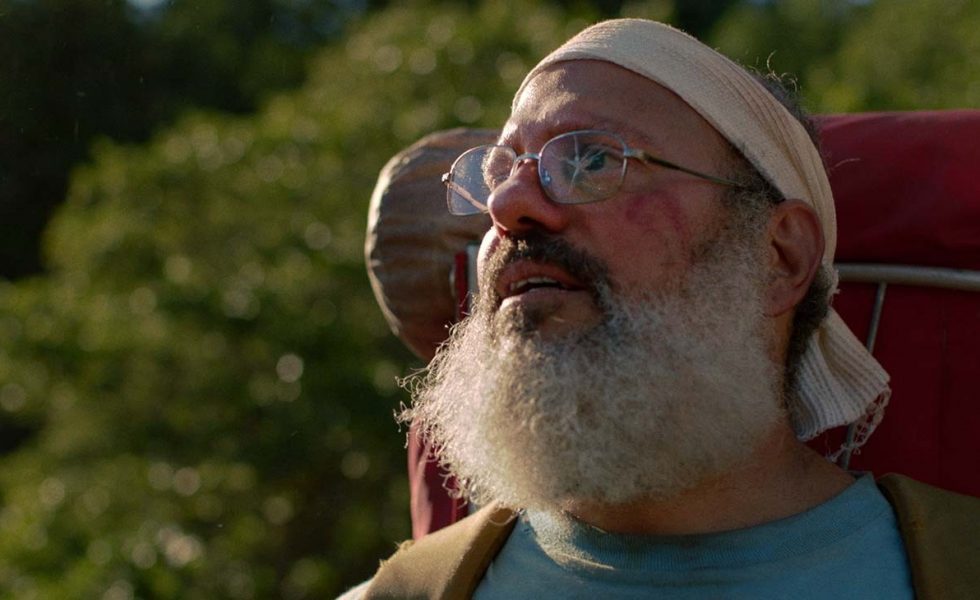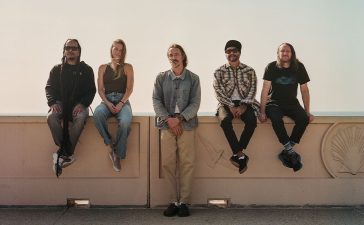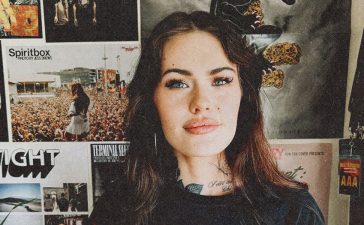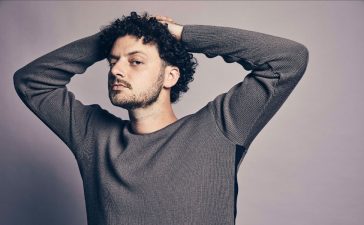When the Zoom meeting kicks off and we’re doing that whole “settling into the groove” thing that all Zoom meetings require, comedian and actor David Cross asks if this is being video recorded for public consumption or will it be a print interview. I assure him it’s for print.
“Okay,” he says. “’Cause I’m jerking off right now. I just want to check super quick if I can continue to do that or should I put it away and save it?”
“Whatever you need to be comfortable, man,” I tell him. “It’s all about the talent.”
He is not, dear reader, jerking it. He’s just cracking a joke, which has been his stock in trade for years now, from cult skit series Mr. Show with Bob Odenkirk to his role as the stupendously ridiculous Dr. Tobias Fünke in Arrested Development and countless points in between. But the subject of our conversation is a more serious work: the indie drama The Dark Divide.
Written and directed by Tom Putnam and based on the memoir by lepidopterist (butterfly scientist to we non-academics) Robert M. Pyle, The Dark Divide sees Cross as Pyle who, after the cancer death of his wife Thea (Debra Messing), sets off on a field expedition across a vast tract of Pacific Northwest national forest in search of new species of moths and butterflies – and some kind of sense of how to continue on after losing the person he loved the most.
While The Dark Divide has plenty of funny moments, this a more thoughtful and dramatic role for you, which prompts an obvious first question: what drew you to the project?
Well, you know, like most things. my agent sent me an email. “Hey, there’s this project? It sounds interesting. It’s a low budget indie thing. Check it out, whatever.” You know, you should ask Tom how he came to go out to me. Once that decision was made by him, I got the script and I immediately was drawn to the story and also the opportunity. It’s rare for me to get this kind of opportunity. And so, those two things combined. I read the script and then I set up a meeting with Tom to meet at a bar.
With this project, particularly with this kind of skeleton crew, it’s a very arduous difficult type of filmmaking with no amenities. And it’s basically me most of the time and if I’m not going to jibe with the director and writer – and this goes the same for him – I would probably have to walk away or he would have to walk away, but we connected immediately. We were going to meet for an hour for a couple of drinks and we ended up hanging out for like three hours at a bar in LA, which is almost unheard of. He was totally approachable, amenable to my suggestions, open to a collaborative relationship working on this. And I said, yes, let’s do it. And then maybe a year later we started shooting.
What did you see in Robert M. Pyle, who is not just a character in the film, but also a real person, that made you think, “I can play this guy”?
Well, I started reading his book that the bulk of the movie is based on before I met him. I don’t really match him physically. He’s a bigger, more kind of avuncular guy than I am. He’s a much, much nicer, sweeter, more timid soul than I am. He’s very Santa Claus-ish. In the script I wanted to make him a bit more naïve than he was. I felt that was important in order to show the journey. Film is much different than a written memoir. What I was trying to tap into was a person who was overwhelmed by grief. I wanted to start from this place and have this evolution happen, this spiritual and intellectual journey happen, during the actual physical journey where he hikes 124 miles in the deepest of woods. So that’s what drew me to that character, the things that I could tap into. I’m really not much like him; we’re two wildly different people. But I guess any actor would have to bridge those two things: the things that they know that are intuitive to them and then the other person and their experience.
I guess making him more innocent, maybe less worldly, it makes the whole journey more mythic, doesn’t it? Because he’s an innocent going out into the world and testing academic knowledge against real world conditions.
Yeah, absolutely. And there are the things he had to wrap his head around as a scientist, as a biologist, as somebody with a several degrees: ideas that go against everything that he has been trained to believe. I’m parsing my words here because I don’t want to give anything away.
You do anchor the film. Much of it is just you alone in the woods, and it is very much a David Cross jam. Were you concerned about your ability to do that? Or do you feel that your background in comedy, where you’re basically out there flying without a net, helped you with approaching this film?
Maybe in retrospect? I don’t think I thought of that initially. I mean whether you’re on camera for seven minutes, 20 minutes, or an hour and 20 minutes, it’s all the same. I was never fearful that people were going to get sick of me or looking at me, and I certainly had the confidence that I could, in the moments needed, be Robert Pyle and go through that thing and convey that emotional response. And you always have the mitigating factor that it’s a little indie film. If this was a Marvel film that they were putting me up there, then yeah. I’d have real concerns, about top-lining that kind of thing. But for this movie?
I have a conversation with every director I’ve ever worked with where at some point early on I will bring up the idea of like, “Hey, can I riff some stuff?” And this was mostly riffed within the existing script, because we were again, a tiny budget and we didn’t have the luxury of if it rained, shooting a different scene. There was no interior set. There was no other scene. We just had to shoot in the rain.
Expanding on that, how physically challenging was the shoot? How long were you out in the woods on location?
It wasn’t the longest. It was like a 22-day shoot, I believe. And we shot in Portland for at least two days. And then the stuff with Debra Messing, his wife, was three days. The rest of it was in the woods and it was definitely the hardest physical thing I’ve ever done. Gruelling. And again, no amenities. And because we were so deep in the woods the Parks Services would get us to a certain place where we could bring vehicles. Then you need to get out of the vehicle, and then you’re lugging in equipment and whatever you can bring in for a day of shooting anywhere from a quarter mile to a mile into the woods.
So, you’re doing everything with minimal coverage and there’s no video village or anything like that. There’s no craft services. There’s none of that. And in some of those places I was staying in a little cabin because where I was initially staying with some of the other people, it was like an hour and change to get home. And I couldn’t afford that on either end of a full day of shooting. So I would stay in this cabin and there’s no food anywhere. I remember I would have peanuts and beef jerky, that was my dinner three nights in a row. I’d go back to this cabin and I’d have peanuts and beef jerky, and just wait for the alarm to go off to get set again. It wasn’t the Hollywood glitz and glamour you read about.
It must’ve been good for characterisation though.
Yeah, it was definitely in my head a lot. And the crazy shit, like there was a mountain lion.
A mountain lion?
One of the parks people had told us that there was a mountain lion. We had this safety meeting where they gathered everybody and they told us about a mountain lion and most of us didn’t understand the severity of the situation, I would say. I guess you would think of it as like if there’s a bear you think, “Okay. There’s a bear. Let’s stay away from the bear. Let’s not agitate the bear. The bear is not going to attack us, and people will keep a lookout for the bear if it comes around.” But the park ranger went on to tell us this horrific story about prior attacks and how they attack unprovoked and they will kill you. There’s barely anything you can do. And then they were like, “All right, have a good shoot.” It was pretty crazy.
How did you find Tom Putnam as a director?
My experience was he was completely collaborative. You know – and this certainly wouldn’t work for a lot of things – but we were equals in a sense. Especially as we got further into it, and as day one became day four became day nine became day… there was some serious bonding that was going on with everybody in the crew because it was hard for everyone. And we’re all in this together.
And every trite cliché about that kind of stuff was really applicable and true. There were no screaming matches or any of that stuff. I mean, people were frustrated about certain things. More than any other project I’ve ever worked on, the maxim of ‘whatever can go wrong, will’ held true. Sometimes it was our fault. Sometimes it was nature. Sometimes it was a human error. And he never lost his shit. There was no diva stuff. He was really a calm presence, and that’s really important. There were no assholes on set. There was no asshole behaviour. I mean, there was tension of course, but it never got bad, and I’ve had my fair share of shoots where somebody blows up or the behaviour is inappropriate or that somebody’s pulling rank or any of that. And there was none of that.
This is a fairly thematically complex film, with a lot going on under the hood of what might appear to be a pretty simple story. Is there any one thing you’d like audiences to take away from The Dark Divide?
To me it’s about appreciating a middle-aged man in his underwear. Let’s not judge, come on guys. Let’s not be so judgemental. You know, there are a lot of middle-aged men in their tighty-whities running around, and let’s dial back on the criticism.










